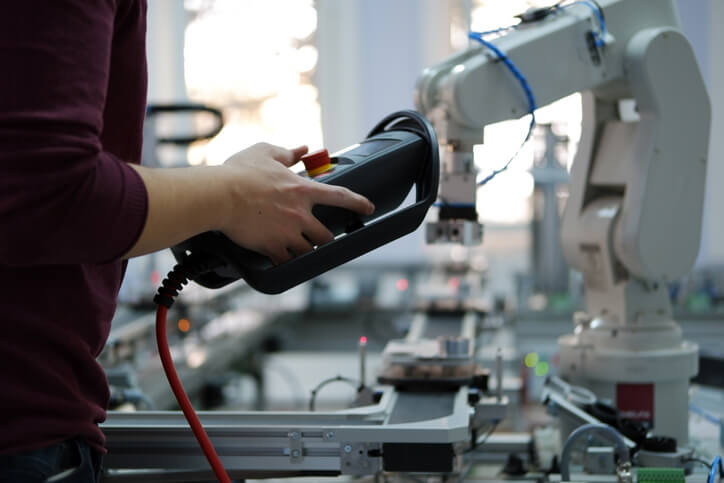Expertise Needed in New Systems and Processes
Industrial automation training is not a new or revolutionary topic for the manufacturing sector, but it is one that is taking on more importance with every passing day. Industrial production processes consist of a series of machines or systems through which a combination of raw materials passes through and is transformed into a final product. Automating many of those processes has become critical for all businesses for various reasons, including increasing overall production, improving the consistency or quality of the product, reducing human-related costs, adding efficiency to the use of raw materials, and making the business more profitable. Automation has also been credited with creating a safer environment for workers and reducing some facets of environmental pollution.
Because of all these benefits and the need to increase production following the pandemic-influenced 2020 downturn, nearly every industry production environment is changing drastically. Manufacturing companies are using automation to increase uptime and reduce overall labor costs, giving leadership and shop managers more predictability of their potential output. As more companies in advanced economies invest in automation, the labor cost gap closes with emerging markets.
The Feedall difference: Employing flexible automation technology now is vital to sustain growth and minimize downtime associated with product changeovers. Learn more here.
Industrial Automation Training is Needed Now
But another gap is looming. Over the next decade, an expected 4.6 million manufacturing jobs will be created, according to a 2018 study by the Manufacturing Institute and Deloitte. However, more than half of new positions could remain unfilled as the lack of a modern workforce invested with industrial automation training has become evident. More than 80 percent of manufacturers are currently struggling to find qualified talent, and many feel this shortfall will negatively impact potential future growth. Manufacturers are facing a reskilling effort to capitalize on the new opportunities presented by further automation and a worldwide market poised for a rebound.
Automation provides many benefits for employees and their companies alike. Automating some tasks, like loading parts into various machines that comprise your production chain, can be a cumbersome and dirty task — and one that is further complicated with the possible addition of chemicals and lubricants and the raw materials themselves. Automated part feeders can contribute to a cleaner and more sanitary environment; more sanitized work environments were certainly emphasized over the last year worldwide.
Automation can provide additional safety measures as well. With a preponderance of heavy equipment and moving parts in most facilities, there are countless ways for accidents to occur. But by allocating parts loading and feeding to automated systems, employees can disassociate themselves from many of the risk factors that can lead to injuries of the extremities or of substances inadvertently getting to the eyes or skin.
Thanks to automated parts solutions, workers can also avoid some of the drudgery associated with simple, repetitive tasks and put their knowledge and skills to use elsewhere in the business. The more effective use of the talent and skill of the people in your company will positively affect your bottom line.
With proper or increased industrial automation training, your facility can improve upon all of the already established benefits of automation. With a better working knowledge of the systems and processes involved, your employees will be safer and more efficient. They’ll also be better equipped to address issues overseeing these automated processes or applying their strengths to other facets of the operation.
The Feedall difference: Explore some specific automated solutions companies can use and customize to bulk feed bin parts between different phases of production.
Feedall Automation Can Help
Automation isn’t as simple as inserting a machine to move parts from one point to another or fulfill another straight-ahead task. Industrial automation also involves incorporating and integrating that equipment into the larger system of the manufacturing process. As control systems have increased in complexity to enable communication and interaction with different parts of the line — to take an action like increasing the rate of feeding, for instance — the insight and expertise needed to see to and work with the automation solutions in place also need to increase.
Feedall Automation has partnered with manufacturers to produce custom-engineered industrial automation equipment for more than 75 years. Our part feeding systems — from robotic solutions to magazine feeders — can stack up against any on the market, and each is built to the specific design and production needs of each client.
The founding principle of our business has been to help customers adapt to the changes of the marketplace and implement automation solutions to help them stay ahead of the curve. And while this often means integrating new automation equipment into your production, it also means complete dedication to the parts, service, and support you’ll need for your automation efforts.
Our engineering department can design a custom unit for your needs or refurbish and update older units for a new application. If the design is yours, we can quote to manufacture not only the parts but also the assembly to save you time and money.
Our staff has, on average, 30 years of experience per team member, which will be helpful when conducting field evaluations for potential problem machinery, or arranging replacement parts for repairs.
Most importantly, with our pledge of ‘cradle to grave’ service, you’ll get assistance with installation and training. This industrial automation training will make sure you’re able to extract all the potential benefits of automation with a workforce that understands the systems, how they work together, and how they can be adjusted for more efficiency and better results. The training can be done at your facility at a discounted rate on all new units. Training is also offered at no charge when conducted at Feedall’s facility.
Contact us today to learn more about industrial automation training for your new automation solutions.
